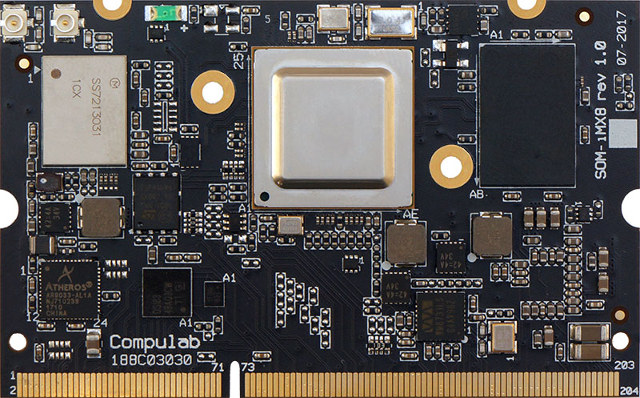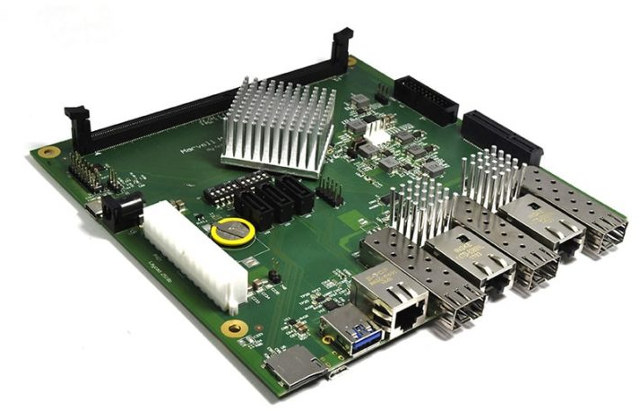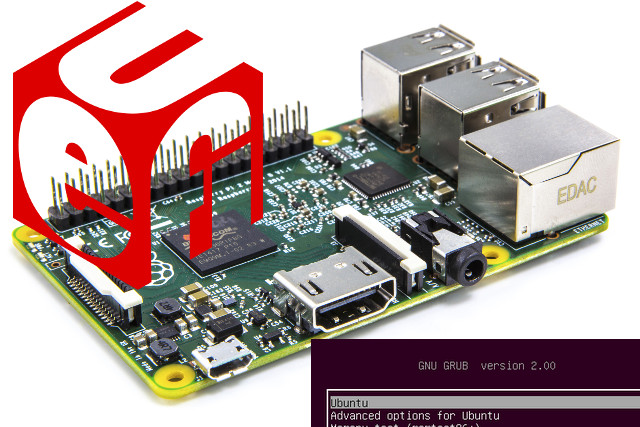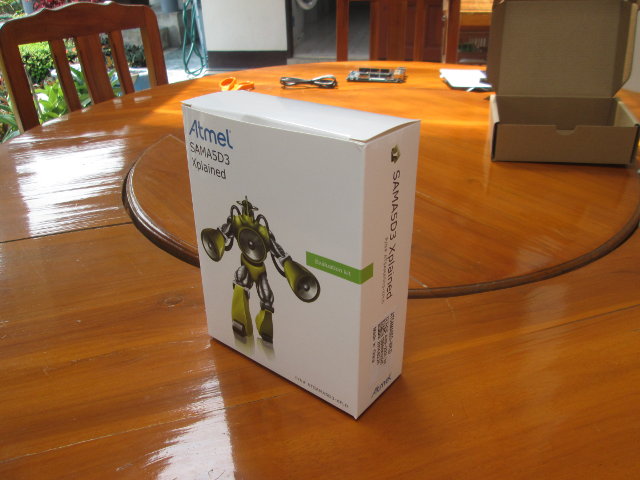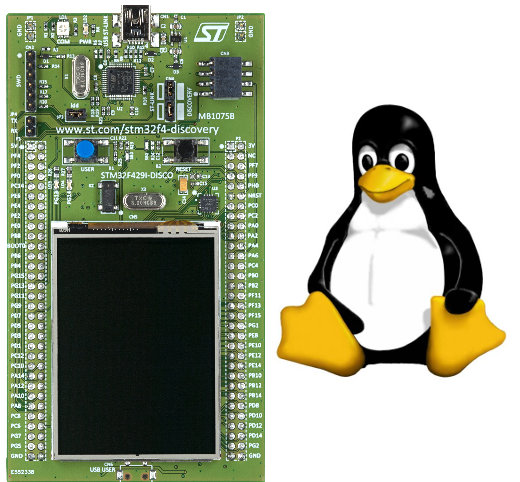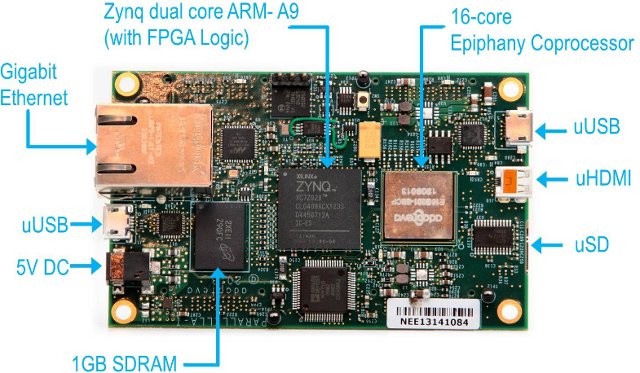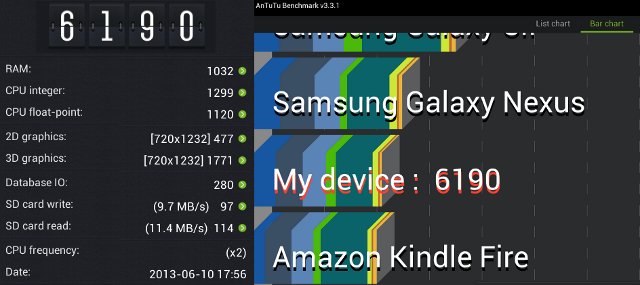I just covered one of the i.MX 8M systems-on-module last Friday with Variscite DART-MX8M SoM, but Variscite is not the only company about to launch such modules, and today I’ll have a look at Compulab CL-SOM-iMX8 system-on-module based on the same NXP i.MX 8M dual or quad core Cortex A53 processor. Compulab’s SoM comes with up to 4GB RAM, 64GB eMMC flash, an optional WiFi & Bluetooth module, as well as optional support for Ethernet, LVDS, analog audio, and more. Contrary to most competitors, the company has also made an habit of releasing detailed pricing the basic configuration and per option. But first, let’s go through the specifications: SoC (one of the other) NXP i.MX8M Quad quad core Arm Cortex-A53 processor @ 1.5GHz with Arm Corex-M4 real-time core, Vivante GC7000Lite GPU supporting OpenGL ES 3.1, Open CL 1.2 and Vulkan NXP i.MX8M Dual dual core Arm Cortex-A53 processor @ 1.5GHz […]
SolidRun MACCHIATOBin Mini-ITX Networking Board is Now Available for $349 and Up
SolidRun MACCHIATOBin is a mini-ITX board powered by Marvell ARMADA 8040 quad core Cortex A72 processor @ up to 2.0 GHz and designed for networking and storage applications thanks to 10 Gbps, 2.5 Gbps, and 1 Gbps Ethernet interfaces, as well as three SATA port. The company is now taking order for the board (FCC waiver required) with price starting at $349 with 4GB RAM. MACCHIATOBin board specifications: SoC – ARMADA 8040 (88F8040) quad core Cortex A72 processor @ up to 2.0 GHz with accelerators (packet processor, security engine, DMA engines, XOR engines for RAID 5/6) System Memory – 1x DDR4 DIMM with optional ECC and single/dual chip select support; up to 16GB RAM Storage – 3x SATA 3.0 port, micro SD slot, SPI flash, eMMC flash Connectivity – 2x 10Gbps Ethernet via copper or SFP, 2.5Gbps via SFP, 1x Gigabit Ethernet via copper Expansion – 1x PCIe-x4 3.0 slot, Marvell […]
U-Boot Now Supports UEFI on 32-bit and 64-bit ARM Platforms
Intel/AMD x86 based computers now boot via a standard UEFI binary, which can load grub2, allows you to update the command line as needed, or select different version of the Linux kernel. On ARM everything is a little more complicated and messy, as bootloaders such as U-boot need to support different configurations formats. Alexander Graf has been working on implementing UEFI support in U-boot, and it’s now supported by U-boot mainline and enabled by default for 32-bit and 64-bit ARM platforms, but not x86-64 (yet). That means you should now be able to boot any ARM boards supported by mainline U-boot through UEFI. Alexander gave a presentation about his work at an openSUSE event in June, and demonstrated u-boot with UEFI, and GRUB2 support with an openSUSE image running on a Raspberry Pi board. Thanks to David for the tip. Jean-Luc Aufranc (CNXSoft)Jean-Luc started CNX Software in 2010 as a […]
Embedded Linux Conference Europe 2014 Schedule – IoT, ARM vs x86, Optimization, Power Management, Debugging…
The Embedded Linux Conference Europe (ELC 2014), CloudOpen, and LinuxCon Europe will jointly take place at the Congress Centre Düsseldorf, in Germany on October 13 – 15, 2014. The 3-day events will consists of keynotes, presentations, and tutorials. Each day will open with two or three keynotes by speakers including Jim Zemlin (Executive Director, Linux Foundation), and Jono Bacon (XPRIZE), followed by presentation and tutorials. There will be 45 presentations for ELCE, 58 for LinuxCon, and 47 for CloudOpen, I’ll make a virtual schedule with a few sessions part of the Embedded Linux Conference Europe “track”. Monday, October 13 11:15 – 12:05 – Performance Analysis Using the Perf Suite by Mans Rullgar, Consultant When faced with a performance problem, the initial steps towards a solution include identifying the sections of code responsible and the precise reasons they are time-consuming. To this end, the ‘perf’ profiling tools provide valuable insight into the […]
Atmel SAMA5D3 Xplained Board Unboxing and Quick Start Guide
Atmel SAMA5D3 Xplained is an evaluation board running Linux powered by SAMA5D36 ARM Cortex A5 micro-processor with 256 MB DDR2, 256 MB flash, two Ethernet ports, 3 USB connectors, and more. This embedded board targets industrial automation, networks, robotics, control panels and wearable applications. The only video output is an LCD connector so it is reserved for headless or flat panel based applications. You can check full specs on my Atmel SAMA5D3 Xplained announcement post. The company kindly sent me a sample, so that I can share my experience with the board. I’ll first post some unboxing pictures, show how to get started with the pre-installed image, and build my own Linux image. The board can be purchased for $79 from Atmel e-Store, as well as several distributors (P/N: ATSAMA5D3-XPLD). Atmel SAMA5D3 Xplained Unboxing I’ve been sent the board via DHL in the following package, which gives a short desscription […]
U-Boot & Linux BSP for STMicro STM32 Discovery Board
If you want to run Linux on STM32 Discovery board, more exactly STM32F429 Discovery board, it’s now possible thanks to Emcraft Systems’ BSP for STM32F429 Discovery Board. It will only work on that particular version of the discovery board as it features 64Mbit external SDRAM, which is required for uClinux, and missing on other STM32 Discovery boards. You can either get u-boot and (uC)Linux from the company’s github account which contains the required patches, but lacks complete documentation, and a default config file for the kernel for example, or purchase a BSP ($33) with 3-month support, and pre-built u-boot and Linux binaries. There’s also publicly available documentation explaining how to flash the bootloader and the kernel among other things, and links to relevant external resources, without the need to spend any money. Jean-Luc Aufranc (CNXSoft)Jean-Luc started CNX Software in 2010 as a part-time endeavor, before quitting his job as a […]
$99 Parallella Supercomputer is Now Open Source Hardware
Parallella is a low cost supercomputer designed by Adapteva using Xilinx Zynq-7010/7020 FPGA+2x Cortex A9 SoC combined with Adapteva Ephipany 16 or 64 cores epiphany coprocessor. The project had a successful kickstarter campaign which allowed then to provide the 16-core version for $99, and the 64-core version for $750. The board will soon be shipped to people who pledged on kickstarter, and one of the promise of the campaign was to fully open source the platform, and today, they just fulfilled that. Before going into the details of the open source release, let’s have a look at the specs: SoC – Xilinx Zynq7000 Series (Z-7010 or Z-7020) Dual-Core ARM Cortex A9 with 512KB L2 Shared Cache Coprocessor – Epiphany Multicore Coprocessor. The Parallella-16 board includes the 16-core Epiphany-III processor The Parallella-64 board includes the 64-core Epiphany-IV processor System Memory – 1024MB DDR3L Boot Flash – 128 Mb QSPI Flash Indicators […]
Wandboard Dual Benchmarks, Serial Console Fun, and Distributions List
Since last time I tried Android and Ubuntu on the Wandboard, a few things happened. I’m not talking about Wandboard Quad announcement, but instead I received a Class 10 SD card, which makes the system so much responsive, and a RS232 to USB adapter so that I can access the serial console. So today, I’ll publish some benchmark results on Wandboard Dual since none appear to be available, and play a little with the serial console. A few things also happened on the operating systems side with more distributions now available for the board. Prerequisites I ran benchmark in Android, so I installed the latest Android 4.1.2 image (11th of April 2012) to my new SD card (ADATA 16 GB Class 10), and contrary to my poor experience on a 4GB Class 4 micro SD, everything was very fluid. I’ve also installed Google Play in order to install the applications. […]


